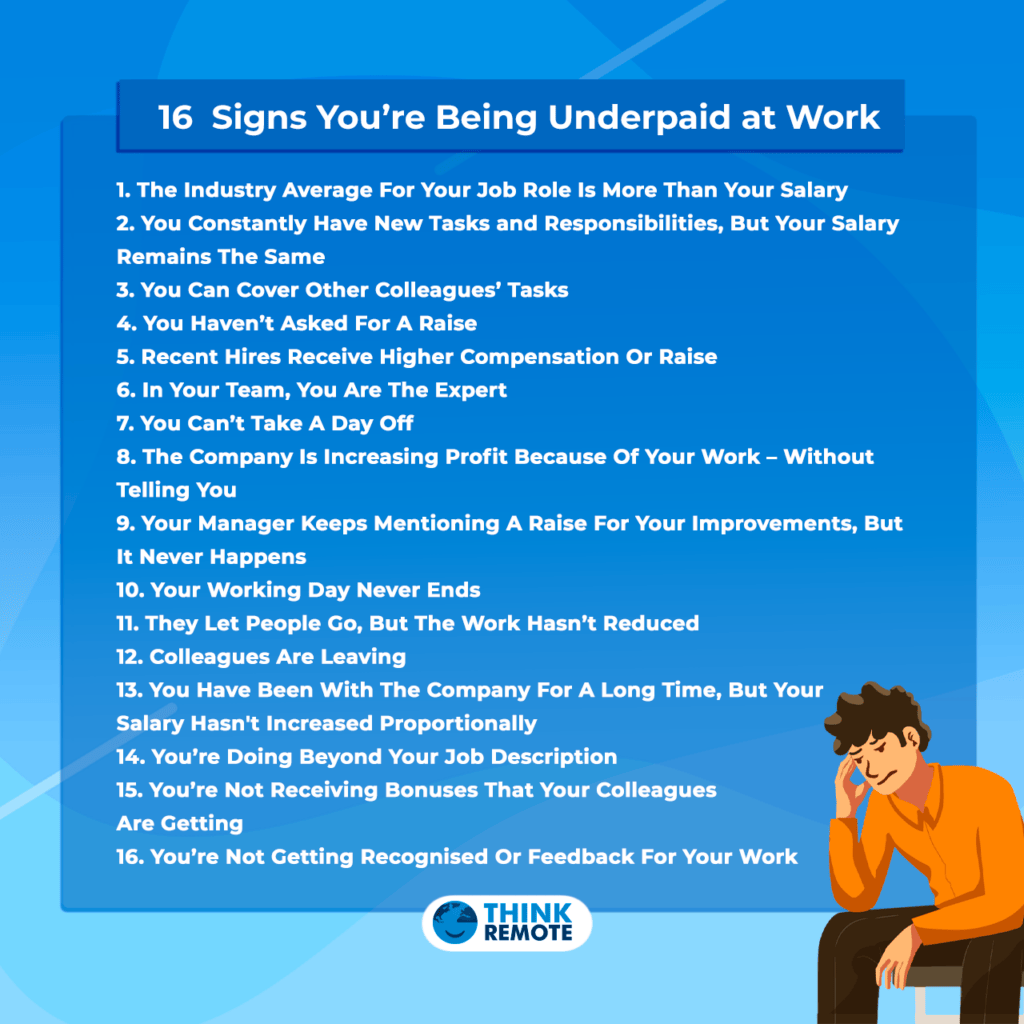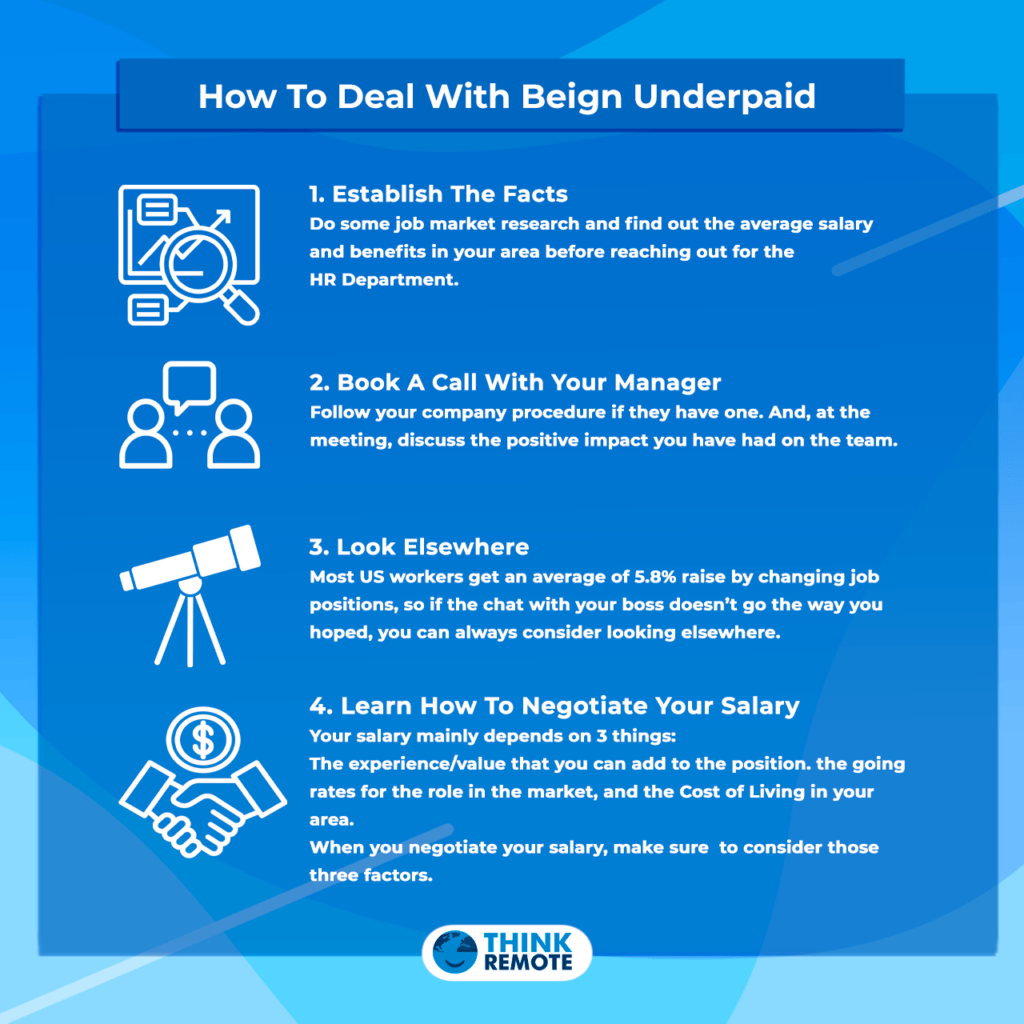Are You Being Underpaid At Work?
You close up your laptop, it’s late at night, and you are exhausted – again, and all you can think about is, “Is this really worth it”? Feeling undervalued and underpaid at work is demoralizing and impacts your well-being and happiness.
We all know how tricky negotiating a salary can be. In this article, we’ll look into a few tricks to negotiate a good salary for your remote job. A good salary is not just important to have a good lifestyle, but to also feel valued.
So, it’s vital to understand if you’re being underpaid. Here are 16 signs you should keep an eye for. 
16 Signs You’re Being Underpaid at Work

1. The Industry Average For Your Job Role Is More Than Your Salary
This is probably the most common way you come to realize that you are being underpaid; you come across a job advert for a similar role, and the pay is better than you currently receive.
You can do your own research at platforms like Glassdoor, search for industry salary surveys, or just trawl through job boards.
2. You Constantly Have New Tasks and Responsibilities, But Your Salary Remains The Same
While your tasks, obligations, and duties pile up, your salary remains steady and immutable. And giving feedback about your workload is often looked down upon.
So, even when you have to give feedback, you aren’t in the position of telling others what to do and end up completing the job yourself.
3. You Can Cover Other Colleagues’ Tasks
If one of your team members is sick, you can cover their tasks to keep the project running. But the others (with the same salary) cannot do your tasks because they don’t have the right skills.
As a result, you have to cover their tasks anytime they have a problem. And, you have to arrange your time to keep up with your and their tasks.
4. You Haven’t Asked For A Raise
As simple as it sounds, if you haven’t asked for a raise, then you may not have been given one.
While a good company will reward you for hard work, in the current climate, many are pinching pennies and saving costs where they can – which might be at your expense.
5. Recent Hires Receive Higher Compensation Or Raise
You have been in the company for a while, proving your commitment and effort for the team. Now the company started recruiting, and you know they are offering more than your current salary to new starters.
6. In Your Team, You Are The Expert
Whether it’s because you’ve been there the longest or you’ve picked up a lot of knowledge along the way, you’re the one that people come to with their questions. Are you being properly remunerated for your expertise?
7. You Can’t Take A Day Off
Does your phone ring every time you take a vacation day or over the holidays? That’s a sign you’re indispensable (or that your team is understaffed).
Remember that being underpaid isn’t just a question of money; there’s a value to be placed on work/life balance and being able to take some real time off.
8. The Company Is Increasing Profit Because Of Your Work – Without Telling You
If your work is increasing leads for your company, and your manager ‘forgets’ to mention it to you (or your colleagues in the same position, for that matter), that’s a sign that you’re not getting the credit or commission you deserve.
9. Your Manager Keeps Mentioning A Raise For Your Improvements, But It Never Happens
Your manager keeps mentioning a raise if you show improvements and commitment during the year. Yet, the conversation just doesn’t happen anymore at the end of the year. The New Year starts, but your salary is still the same. Suddenly, a possible raise comes into the conversation again – of course, for the following year!
10. Your Working Day Never Ends
If you work out of the clock, and none is paying you for those extra hours, you are being underpaid.
11. They Let People Go, But The Work Hasn’t Reduced
A common experience during the pandemic was companies cutting staff numbers as work levels reduced – but now they are picking back up again, and those people haven’t been replaced.
12. Colleagues Are Leaving
If your colleagues are starting to look elsewhere, it’s a sign that the grass is greener somewhere else, but it can also put you in a stronger bargaining position as you hold knowledge and experience that new hires won’t.
13. You Have Been With The Company For A Long Time, But Your Salary Hasn’t Increased Proportionally
If you’ve been with the company for a significant amount of time, but your salary hasn’t kept up with your level of experience, skills, and contributions, it’s a sign that you’re being underpaid.
14. You’re Doing Beyond Your Job Description
If you’re constantly given tasks outside of your job description, it’s a sign that you’re being underpaid. This is true when the tasks that you get are highly skilled or require effort.
15. You’re Not Receiving Bonuses That Your Colleagues Are Getting
If you notice that you’re not getting similar perks or bonuses that your colleagues are getting, then you could be underpaid.
16. You’re Not Getting Recognised Or Feedback For Your Work
If you’re not receiving proper feedback for the work that you do, it could be an indication that your work is not being valued by your colleagues or employers.
How To Deal With Being Underpaid?

- Establish The Facts
First, do a little research to make sure you are underpaid. Do some job market research and find out the average salary and benefits in your area – Glassdoor and PayScale are two valuable indicators to start your research. However, remember to match the salary with your local living costs if you are working in a remote team.
After that, you should talk with a trusted colleague to confirm your findings and go to the HR department. Each company is different, and you might have to follow a strict procedure to complain about underpaying or ask for a raise.
- Book A Call With Your Manager
Once you can make your case, book a call with your manager. If your company has a defined procedure, you will have to follow that, for example, writing a formal letter or e-mail to arrange a meeting. If not, you should mention the reason for the meeting in the invitation email and include the reasons why you feel underpaid and your willingness to discuss the issue.
Pro Tip: How to tell your boss you want a raise?
At the meeting, make the case for your pay increase. Discuss the positive impact you have had on the team, for example, where you have completed projects or helped colleagues out. Make a note of training courses completed etc., to build a picture of your accomplishments. You want to make your manager realize you are worth more and that it would cost them more to replace you!
- Look Elsewhere
While contacting your manager, you might also want to prepare your CV so you can apply for other roles.
According to ADP Research Institute, most US workers get an average of 5.8% raise by changing job positions, so if the chat with your boss doesn’t go the way you hoped, you can always consider looking elsewhere.
You could also apply for a part-time position, telling your manager that you are taking another job to cope with the lack of salary. If you have another opportunity in your hands, you will have more power during the negotiation process – also considering how much the company will spend in time and resources by hiring someone else.
Being underpaid is one thing, but asking for a higher salary is a whole new ballgame. According to a survey, only 37% of people negotiate their salary. Here are a few ways you can negotiate a greater pay.
- Learn How To Negotiate Your Salary
Your salary mainly depends on 3 things:
- The experience that you have and the value that you can add to the position.
- The going rates for the role in the market.
- Cost of Living in your area.
When you negotiate your salary, make sure you take the above three factors into consideration. Furthermore, mentioning these factors when you negotiate for the salary adds credibility to your demand. You’re not just asking for a higher paycheck, but also giving compelling reasons.
When you’re applying for a job, the hiring manager may often ask you what your expected salary may be. In such cases, always give a range. The range will include a minimum, below which you can’t afford to go.
Last Thoughts About Being Underpaid at Work
Making sure you have not been underpaid at work is your right, and you should fight for it. However, you always have to analyze your individual case.
As we said, sometimes what you earn isn’t money. And in some cases, the problem is that you are just fed up with the job. Just remember that besides salary, other factors determine if your job is worth it or not. You should close your laptop satisfied and feel happy with your team members and the company you work for. If this is not the case, it’s time to consider changing your job!
FAQs About Being Underpaid At Work
All employers must respect a national minimum wage with their employees. In 2009, the US Fair Labor Standards Act (FLSA) set the federal minimum wage at $7.25/hour and $2.13/hour for tipped workers. In January 2022, President Joe Biden raised the minimum wage for federal contractors to $15/hour.
Check your local law about minimum wage. The 29 states and D.C. have different statewide minimum wages and legal requirements.
When you realize you’re being underpaid, it’s essential to gather information, prepare a case, and request a meeting with your manager to discuss your concerns. Be clear and confident about your value and the contribution you bring to the company.






